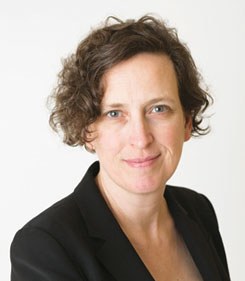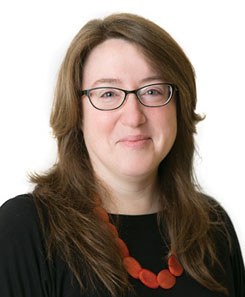Libraries and Civil Society
Just saving the world, by the way

“Nobody expects libraries to save the world, but we are in a perfect position to do just that,” say Rebecca T. Miller and Rebekkah Smith Aldrich. In this interview, the two US library experts explain why the belief that digitisation makes libraries irrelevant is a myth.
By Leonard Novy
Many people worry about the future of libraries, fearing that libraries, in their classical shape and form, are rendered obsolete by the internet. Is that so? If not, how does the role of libraries change in changing societies?
Rebekkah Smith Aldrich: Libraries are about people, not stuff. We are educators, we ensure access – regardless of format or topic. Access to our neighbors, local experts and public spaces for dialogue will always be important. The best of today’s libraries are vibrant, proactive places that reflect and engage their community. Libraries that are not embracing the role of a community gathering place are missing out on one of the best parts of the future of libraries.
Rebecca T. Miller: People seemed to be hooked on stories about the demise of libraries since the advent of the Internet—but they are basically myths. The role of the library is actually relatively stable, it’s just the tools at their disposal – complementing books, themselves revolutionary technology for democratizing access – are now much more varied, robust, and exciting. What is more, the access they enable is unprecedented. Let’s not forget that public libraries made personal computers accessible in cities and towns across the U.S., and offered training on how to use them. And academic libraries provided the resources for Google books. It’s mistaken to look at libraries as opposed to technology when in fact they go hand in hand.
You argue that “No one expects libraries to save the world, but we’re in perfect position to do so.” What do you mean by that?
Miller: I don’t think I can count how many times I have heard someone say that a library saved their life, or shaped their life, or help them become themselves. That’s individual experience. When you consider how ubiquitous libraries are, and how influential they are to the well-being of their communities at the core of their mission, you can begin to envision how impactful they could be if they decided to help their communities address a pressing issue, such as climate change, for instance.
Smith Aldrich: Let’s think about how disruptive our world today is. In every sector – political, technological, economic, environmental and social – we are contending with disruption that provides both opportunities and challenges depending on your socio-economic standing in your community. Social cohesion is at the core of how well communities will fare in the coming decades – regardless of what disruption they are faced with – and libraries are perfectly positioned to strengthen social cohesion locally. We can be intensely focused on local issues, we can help bring people together, to help neighbors recognize and value diversity and to help all be heard – four ingredients identified by the United Nations Intergovernmental Panel on Climate Change as integral to our survival in the coming years.
As libraries we need to be embedded, in an authentic and meaningful way, into the lives of those we serve.
Rebekkah Smith Aldrich
Miller: Libraries have always been about helping their patrons or communities prepare for the future. Here we have a future that is compromised by a massive, interconnected problem—human-driven climate change. As a global network of institutions dedicated to addressing information needs, and trusted to do so, I believe they can be catalysts for real movement on creating a more sustainable society if they choose to approach the work through that lens.
Smith Aldrich: As libraries we need to be embedded, in an authentic and meaningful way, into the lives of those we serve. That means understanding the status of the building blocks of life, that means awareness of the wider world around us. The library is how we translate our desire to be of service to our fellow citizens. We cannot be relevant if we do not understand what people are currently dealing with or facing in the future. If we are to truly convey to those we serve that we care about their well-being and that we are trusted institution that are good stewards of their trust and tax dollars there needs to be an inherent commitment in our libraries to environmental sustainability. If we are careless with natural resources, if we do not respectfully dispose of unwanted items, if we do not help to educate others of the effects of our actions on the natural world there will not be much left for us to do in a few decades other than disaster response. We will be on the front lines of helping more and more citizens with what may have been preventable problems or issues we should have learned to adapt to.
You are both involved in the Sustainability Initiative of the New York Library Association. What is it about?
Miller: It is all about enabling libraries to take action to address climate change, and to lead their communities in doing so. In practical terms the initiative is focused on raising awareness and providing actionable ways for librarians and their institutions to engage in this work – internally in terms of being themselves sustainably oriented and externally in terms of being a leader on sustainable thinking for the community. That’s why we created a Sustainability Certification program, a road map of sorts, for libraries to use as they accelerate their response to the environmental crisis we all face. As we recently reported in Library Journal, the Hendrick Hudson Free Library in Montrose, New York – one of the first to attack the certification – has installed 289 solar panels on the roof of a new addition, and helps drive learning for the community with a kiosk that reports out metrics.
Libraries need to place themselves at the table in the conversation about what the best future is for their communities, and then help get there.
Rebecca T. Miller
Miller: They need to be able to articulate what their institutions deliver, and what that means in terms of impact on the people and local communities they serve. And, they need to leverage partnership to make their work more and more meaningful. Libraries need to place themselves at the table in the conversation about what the best future is for their communities, and then help get there.
Smith Aldrich: I heartily second Rebecca’s point. Why we do what we do is much more important to talk about than what we do. I also feel that for library leaders to be successful they need to be focused on the “Three Es of Sustainable Libraries”: Empower, Engage, Energize. These three actions describe how library leaders should approach their work to inspire people inside of the library organization and community members. I have observed that this attitude in how we interact with others has a fascinating energy exchange – if your work is focused on empowering, engaging and energizing others they, in turn, will do the same for your library. I have found this to be a “secret ingredient” for many of the most successful libraries I have worked with.

